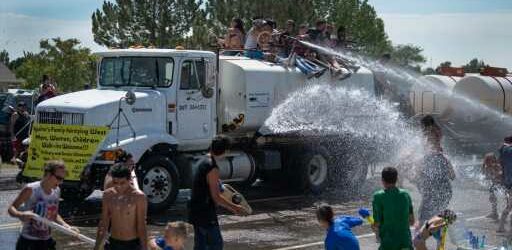An annual Colorado wet parade touted as America’s biggest water fight west of the Mississippi River — drawing thousands, some aiming truck-mounted high-pressure blasters — faces an uncertain future.
The intensifying drought, and shrinking available water, have forced metro district leaders of unincorporated Pueblo West into a debate over whether this splash fest, which has escalated over the past two decades, sends the right signals.
“We’re in a rural, desert location” where household water supplies are dwindling, district clerk Brandi Blankenship said.
Up to 18,000 participants, many from out of town, have deluged Pueblo West’s Joe Martinez Boulevard. Some arrive days early to position water trucks and re-supply containers along the parade route.
Pueblo West Metro District board members recently had to rethink another decades-long tradition of unbridled growth, and they set limits on new development due to insufficient water. They’ve been scrambling, for nearly 20 years, to line up more water by buying a ranch 127 miles away along the Arkansas River near Buena Vista — to let that irrigated land go dry so that they’d be entitled to take more. Board members now have resolved “they’re not going to have any more growth that isn’t sustainable,” Pueblo West spokeswoman Samantha Dosen said.
Meantime, Colorado’s extra-dry April — favoring fast-moving wildfires — has compelled board members also to weigh mandatory yard watering restrictions for residents. In this context, the July 4th Pueblo West Wet Parade remains “up in the air,” Dosen confirmed.
Robust behind-the-scenes discussion will culminate next week at a board meeting with the proposed restrictions and wet parade up for votes, she said. “It is a pivotal conversation.”
The decision here may reverberate around a water-challenged state where scores of towns revel in summer splash events, some dating to the 19th Century.
Even during exceptionally dry times, towns mostly have carried on. At Kersey, 15 miles east of Greeley near the South Platte River, a July 15 “Splash Day” featuring inflatable water slides, pool and fire truck dousing in the town park has grown into an increasingly popular event, recreation director James Neill said.
“We are continuing,” Neill said. “We have a decent water source. Right now, we don’t have any stringent water restrictions.”
In the southwestern mountain mining town of Ouray, volunteer firefighters for more than a century have squared off using pressurized hoses in a water fight that also has escalated. By the 1970s, top teams were adapting face masks and body armor to outlast opponents. Top competitors train year-round and regard the event as one of their most important civic commitments.
Nearby at Nucla, where laborers in 1894 completed a 17-mile water diversion ditch from the San Miguel River, the annual summer water parade amounts to “celebrating the building of the town,” said Tina Carver, a retired teacher and librarian who was coordinating fundraising.
“We do it whether it is dry or not. It is a dry year this year. It was a dry year last year. It was a dry year the year before,” Carver said. “Nobody’s canceling anything. But we could use more water. That’s definitely for sure.”
In the southern gateway city of Trinidad, dam gates were open this week allowing reservoir water to flow through town in the Purgatoire River, Colorado Welcome Center director Marty Hackett said. And Trinidad’s July 4th parade looks set to be wet at the end. “If you don’t want to get wet, you get out of the way,” Hackett said. Fire truck crews and residents battle over a four-block area. “There’s not a significant amount of water wasted,” she said, though crucial mountain snowpack runoff that feeds the reservoir is “not as good as we’d like it to be.”
State climatologist Russ Schumacher said parts of Colorado in April were the driest on record and the overall mountain snowpack after the first week of May measured 56% of the norm. Snow is melting faster than usual, due in part to dust from a drier landscape settling on snow. Colorado’s Eastern Plains between Denver and Kansas in April had record-low precipitation, Schumacher said, adding he’s heard about ranchers now contemplating whether to sell cattle.
Water shortages likely will intensify, especially for communities relying on the Colorado River as a source, he said. “The long-term climate signal is certainly not in our favor. As it gets warmer the air wants to take more water up from the ground. But people want to use more water. The challenges are going to persist.”
Whether to hold beloved water parades “is a complicated issue,” Schumacher said. “Water’s something we rarely have enough of” and re-orienting these events toward conservation might be helpful, he said.
“Whatever towns and communities can do to raise awareness of the importance of water, and the challenges, is a good thing. People love our rivers for recreation — fishing or rafting. And the rivers provide the water for irrigation and drinking and everything else. It’s good to celebrate and appreciate that. At the same time, its important to recognize changes that are happening and where your water comes from.”
Pueblo West’s wet parade began in the 1970s when fire chief Jack Fowler, during a parade, sprayed spectators who looked hot. Since then, the event has turned into “the largest wet parade and water fight west of the Mississippi,” Pueblo West’s website declares.
Windswept with summer temps reaching 100 degrees, Pueblo West sits on former cattle grazing land tantalizingly close to the massive Pueblo Reservoir, which can hold up to 349,940 acre-feet (1 acre foot = 325,851 gallons). But that water already is spoken for under Colorado’s legal system for divvying water based on first-come-first serve. Land developer and oil magnate Robert McCulloch – who had created Lake Havasu City in a desert along a reservoir between California and Arizona – founded Pueblo West in 1969 after most water rights to Arkansas River water already were allotted.
Yet Pueblo West leaders have promoted population growth, at some of the fastest rates in the state – the population expanded from 16,899 in 2000 to around 33,000 — outstripping available water. District officials’ website still includes an appeal for new commercial and industrial enterprises, declaring “we are interested in seeing development happen quickly.”
Thousands of residential lots still are listed as available for construction. However, a district board decision in March means $11,000 water taps for residential construction will be limited to 400 a year this year and next, and 100 in 2024.
Other southern Colorado towns, such as Fountain, have issued moratoriums on new construction for lack of sufficient water supplies.
One possibility would be to re-focus the wet parade creatively on water conservation, Dosen said. “How can we change it, if we are going to change it?”
Or board members could ban large water trucks and tanks “unless they are filled up somewhere outside of Pueblo West,” she said. “But how could you guarantee that? How do you police that and make sure people aren’t using Pueblo West water?”
Lacking a police force, they’ll rely on the Pueblo County Sheriff, whose deputies typically are keen for a few days off, if scheduling allows, around the 4th of July.
What if water-fighters still converge, even if the parade officially is canceled?
“We would have to work really hard with the sheriff’s department to make sure people weren’t showing up as they traditionally have been, like, with trucks and pressure hoses,” Dosen said.
In the past, local entrepreneurs designed custom blasters. Then, the COVID-19 pandemic hit. Government health authorities prohibited the wet parade.
This summer’s first post-pandemic event, if it happens, would bring a welcome economic boost. At restaurants and cafes along Joe Martinez Boulevard, employees said they need it.
“I’m hoping they get it going again. It’s just a big water fight, kind of crazy. The whole street gets packed,” said Jesse Duran, deputy manager of Cakes By Marie.
“I didn’t know there were limits on the water.”
Source: Read Full Article





